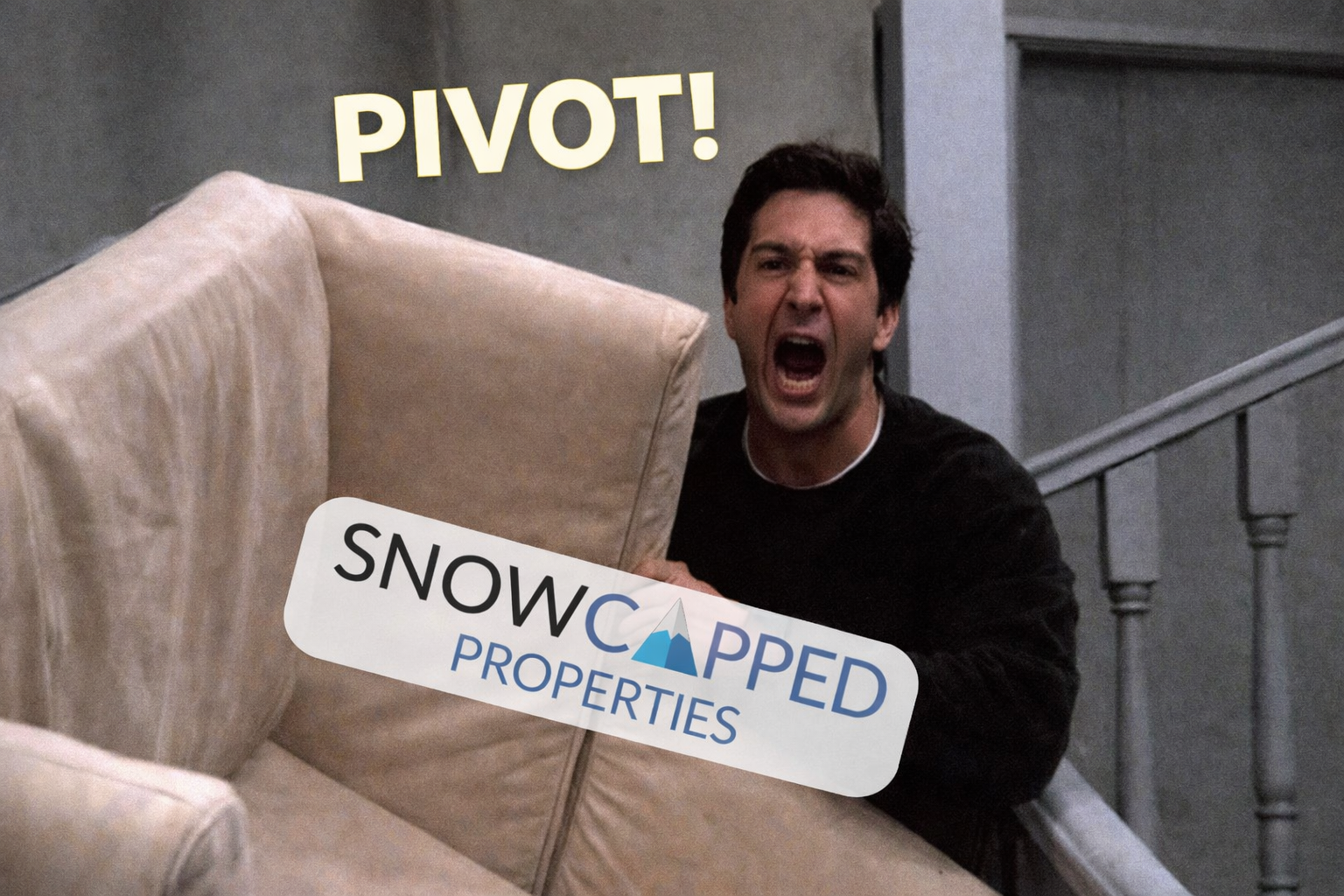STR Fees Increase as More Convert to Long Term Rentals
Charles Phanumphai • January 13, 2025
Why More Cities in Grand County Are Adding STR Pressure—And Why Homeowners Are Shifting to Long-Term Rentals
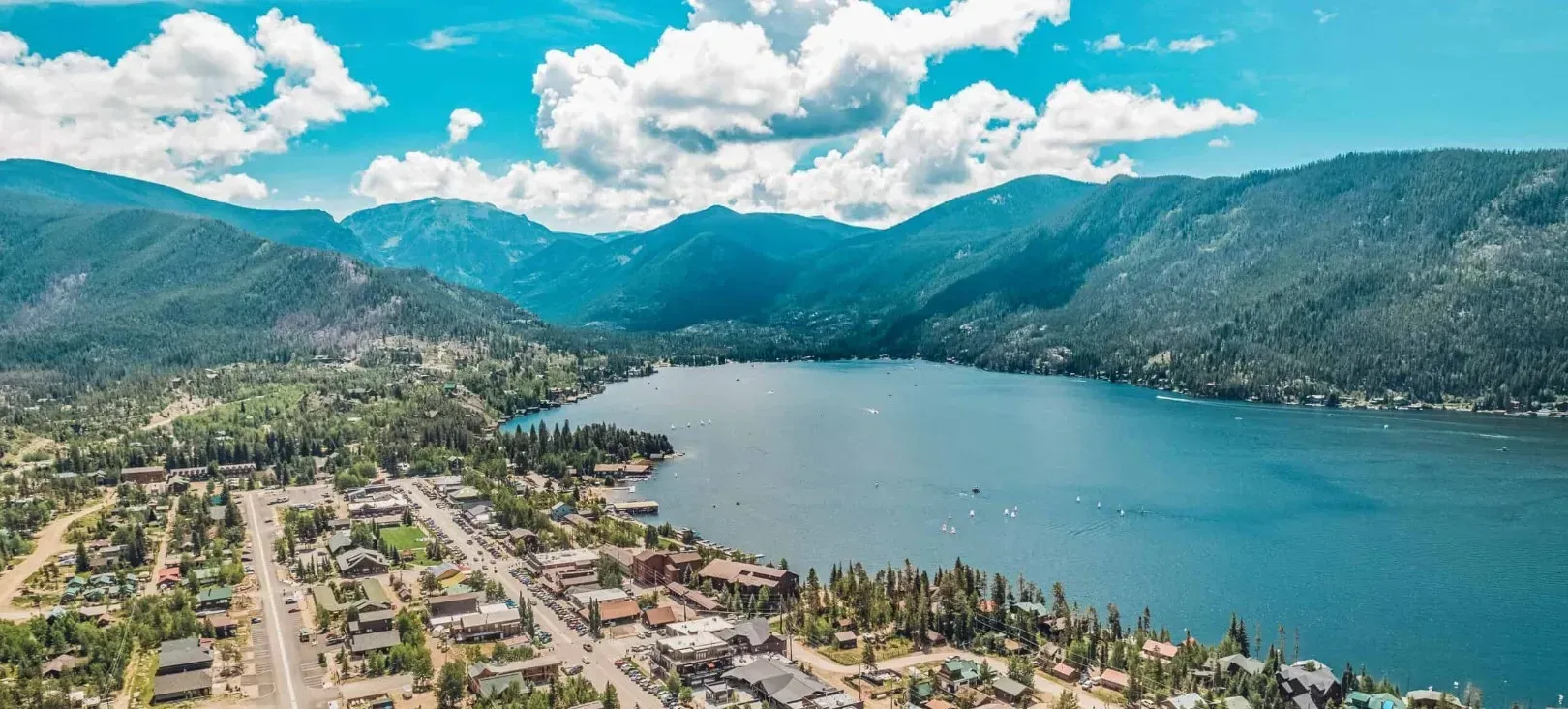
In recent years, cities and towns across Grand County, Colorado, have increased pressure and costs on short-term rental (STR) homeowners and operators. This trend reflects a broader effort to manage the impact of STRs on communities while addressing housing affordability issues. One recent example is the Grand Lake Board of Trustees’ decision to raise fees and deposits for various licenses, including nightly rental licenses, starting in 2025.
Fee Increases in Grand Lake
The new fee structure for nightly rental licenses in Grand Lake represents a significant cost hike for STR operators. While the one-time application fee remains unchanged at $165, the annual license fees have increased considerably. Here’s a breakdown of the updated fees based on occupancy levels:
1-3 Occupancy: $700 per license
4-6 Occupancy: $900 per license
7-10 Occupancy: $1,100 per license (a 22% increase from $900 in 2024)
11+ Occupancy: $2,000 per license (a newly added tier)
These fees must be paid annually to renew a nightly rental license and maintain compliance with local regulations. According to Grand Lake Treasurer Heike Fawkes, revenue from these fees funds the town’s general operations, attainable housing initiatives, program advertising, code enforcement, and other administrative costs. In 2024, the town collected approximately $84,000 from nightly rental licenses, and that figure is expected to rise in 2025 due to the fee increases.
Why Are Fees Increasing?
Under municipal codes, towns like Grand Lake have the authority to update fees to offset the direct and indirect costs of administering STR programs and mitigating their impacts on the community. These impacts include:
Strain on Housing Availability: STRs often reduce the availability of long-term rentals, contributing to a housing shortage for residents.
Community Concerns: Increased tourist activity can lead to noise complaints, parking issues, and other disruptions.
Administrative Costs: Running STR licensing programs requires funding for advertising, enforcement, and compliance monitoring.
The Shift Toward Long-Term Rentals
As STR costs rise, many homeowners who are barely covering their expenses are reevaluating their options. Here’s why more homeowners are making the shift to longer-term or seasonal rentals:
Rising Costs and Complexity: Higher fees, stricter regulations, and increased administrative burdens make STRs less financially appealing.
Stable Income: Long-term rentals provide a consistent income stream without the seasonal fluctuations of STRs.
Reduced Oversight: Managing a long-term rental typically requires less oversight and fewer resources compared to the constant turnover and upkeep of STRs.
Community Impact: Some homeowners are motivated to contribute to local housing solutions, offering their properties to residents rather than tourists.
Many of these homeowners are turning to Snow Capped Properties to manage their long-term rentals. As one of the largest—if not the largest—long-term rental companies in the Winter Park to Grand Lake area, Snow Capped Properties manages over 75 properties and is continuing to grow. Their expertise and local presence make them a go-to partner for property owners navigating the transition to long-term rentals.
Conclusion
For STR homeowners in Grand County, the financial and operational challenges of maintaining a nightly rental license are growing. As cities like Grand Lake continue to implement fee increases and other regulatory measures, many property owners are finding that transitioning to long-term rentals offers a more sustainable and community-focused alternative.
Whether driven by economic necessity or a desire to address housing needs, this shift highlights a critical moment for Grand County’s rental market. Homeowners navigating these changes should carefully evaluate their options to ensure their properties remain both profitable and aligned with community priorities.

What to Expect in Spring & Summer 2026 After several years of elevated mortgage rates slowing buyer activity, the real estate market is shifting again. Lower interest rates are improving affordability and opening the door to more home buyers in Grand County — setting the stage for a busier Spring and Summer 2026. Why Lower Rates Matter Even small declines in mortgage rates can significantly reduce monthly payments and increase purchasing power. As rates ease, buyers who were previously priced out or waiting on the sidelines are re-entering the market, increasing overall transaction activity. Here’s what Snow Capped Properties anticipates for the upcoming season: Increased buyer activity this spring, driven by improved affordability More homes hitting the market, as sellers respond to renewed demand A more balanced market, with realistic pricing becoming essential Strong interest in Winter Park, Fraser, and Granby, especially for primary and long-term rental homes Modest price growth, not rapid spikes, supported by healthier fundamentals Why Timing Matters As buyer confidence grows, competition is likely to increase later in the season. Buyers who act earlier often benefit from better selection and stronger negotiating leverage. The Bottom Line - Lower mortgage rates are reigniting buyer demand and creating real opportunity in the Grand County real estate market in Spring and Summer 2026. Whether you’re buying, selling, or planning ahead, understanding this shift can help you make smarter, more confident decisions.

At Snow Capped Properties, we believe great property management is a true partnership. While we’re proud to work with a wide range of homeowners across Grand County, experience has shown that the most successful and stress-free relationships tend to share some common traits. If you’re wondering whether Snow Capped is the right fit for you—or if you’re considering becoming a rental homeowner—here’s what our ideal Snow Capped client typically looks like. 1. Strong Equity Position or Pre-2020 Purchase Our best-fit homeowners typically purchased their property prior to 2020 or have built a healthy amount of equity. This flexibility allows owners to make long-term, strategic decisions during market shifts rather than reacting emotionally to short-term fluctuations. 2. Comfortable With Being a Landlord (Even When It’s Uncomfortable) Being a landlord is not always passive. It involves decision-making, risk, and occasional discomfort. Our ideal owners understand this and recognize that property management operates within signed owner and lease agreements, with responsibilities on both sides. Trusting the process—and the contracts in place—is key to long-term success. 3. Realistic About Wear and Tear Rental properties are lived in. Even great tenants cause normal wear and tear over time. Successful owners understand the difference between damage and everyday use and plan accordingly, rather than expecting a property to remain in “showing condition” indefinitely. 4. Maintains Adequate Reserve Funds and Clear Spending Expectations Strong reserve funds are critical. Our ideal homeowners are prepared for routine maintenance, preventative upgrades, and unforeseen repairs. Our owner agreement includes a pre-authorized spending threshold, allowing Snow Capped to coordinate necessary repairs without prior approval. This expectation is set upfront because time is often of the essence, and delays can increase costs or impact tenant experience. 5. Communicates Well and Trusts Us to Act Clear, timely communication is essential. Delays in owner approvals can slow repairs, lease execution, and turnovers. If an owner prefers less day-to-day involvement, they may authorize us to act more independently within agreed parameters. We always maintain transparent communication—but when action is needed, speed matters. 6. Respects Mandatory Turnover Timelines A minimum five-business-day buffer after tenant move-out is required before owner use unless a new lease requires faster turnaround. This window allows us to complete walkthroughs, address cleaning, repairs, and maintenance, and ensure the home meets our quality standards. Quality turnovers cannot—and should not—be rushed. 7. Uses Email as the Primary Communication Method Email is our primary and preferred method for non-emergent communication. It allows us to track conversations, stay organized, and respond efficiently. Texts can easily get buried due to message volume. Phone calls are best reserved for emergencies or longer discussions. 8. Values Feedback, Accountability, and Referrals Our best clients provide constructive feedback, understand we are continually refining our processes, and refer friends and family when satisfied. Word of mouth remains our strongest and most appreciated form of marketing. 9. Understands That Unforeseen Issues Happen Even with careful planning, surprises occur—weather events, appliance failures, vendor delays, or tenant-related issues. Ideal owners judge success by how issues are handled, not by whether they occur. 10. Pays Management Bills on Time 🙂 Timely payments allow us to pay vendors promptly, maintain strong local relationships, and keep operations running smoothly. Our Shared Commitment to Quality Housing Snow Capped is committed to providing high-quality, well-maintained housing for the Grand County community. We are not in the business of cutting corners or running low-quality rentals. Our reputation—and our success—is built on maintaining solid homes, strong tenant relationships, and long-term owner partnerships. We expect our owners to share that same standard. Is Snow Capped the Right Fit for You? We’re intentionally not the right property manager for everyone. Our goal is to work with homeowners who value professionalism, transparency, and long-term success. If this resonates with you, there’s a good chance we’ll work very well together. If you’re unsure, we’re always happy to have an honest conversation. — Snow Capped Properties Local. Professional. Relationship-Driven.
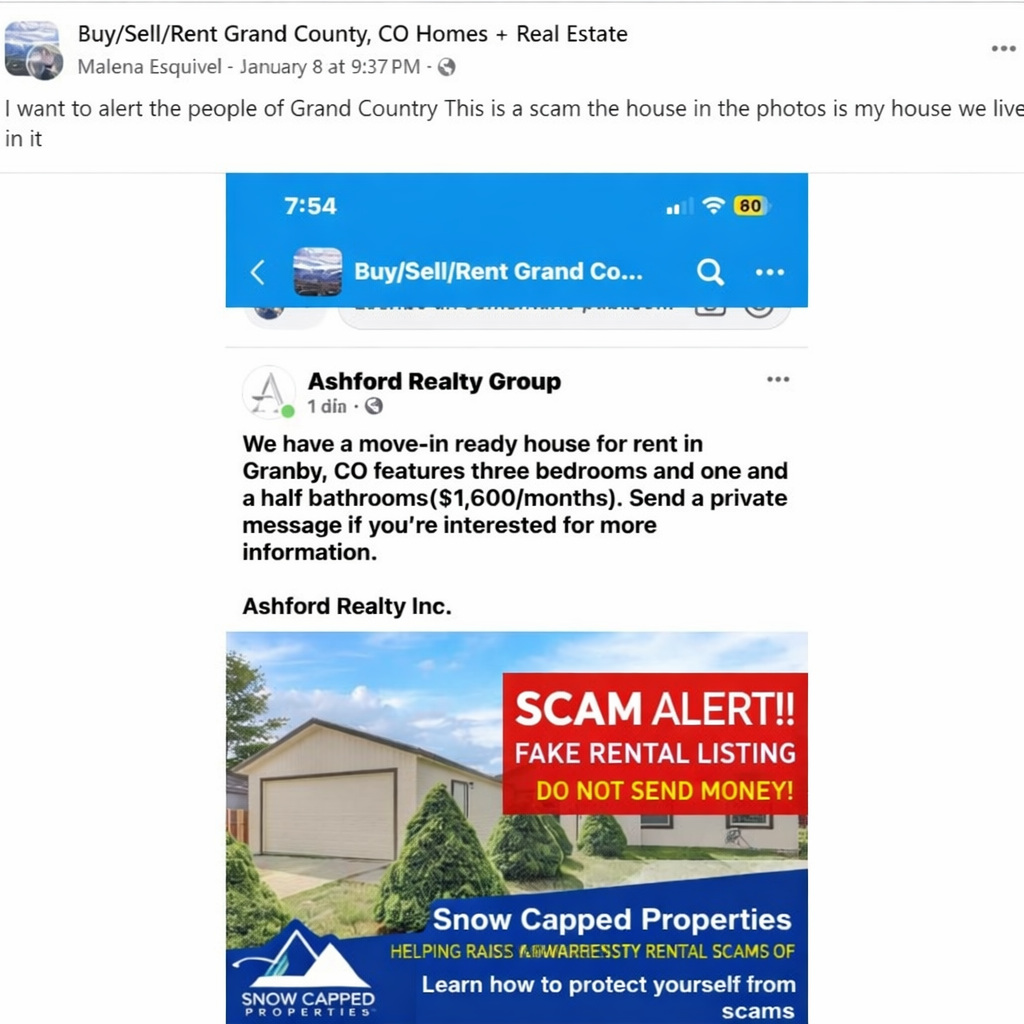
Rental Scams in Grand County: How to Protect Yourself Rental scams are increasing in Grand County, Colorado, with fraudulent listings appearing on social media and online marketplaces. These scams often use stolen photos and fake rental details to mislead renters and homeowners. In one recent case, a home that is actively occupied by its owners was falsely advertised for rent without authorization. The listing appeared legitimate but was later confirmed to be a scam. Snow Capped Properties contacted the homeowner directly and received permission to share this experience to help educate the public and prevent future scams. Common Rental Scam Red Flags Photos copied from Zillow, MLS, or Google Rent priced below market value Requests for deposits before a showing “Out of town” owners or agents Communication limited to text, DM, or email How Renters Can Avoid Rental Scams Never send money before seeing a property in person Verify the landlord or property manager is local and licensed Confirm the property is actively listed by the owner or a reputable company Be cautious of pressure tactics or urgency How Homeowners Can Protect Their Property Search your address online and on social media platforms Monitor Facebook rental groups Report unauthorized listings immediately Work with a trusted local property management company Why Local Property Management Matters Working with a locally established company like Snow Capped Properties helps protect both homeowners and tenants. Local professionals verify listings, manage properties in person, and understand the Grand County market and community. If you’re unsure whether a rental listing is legitimate—or want help verifying one—reach out to a trusted local expert before moving forward. Protect yourself by staying informed and working with reputable, locally present professionals. — Snow Capped Properties Grand County Property Management & Real Estate Experts
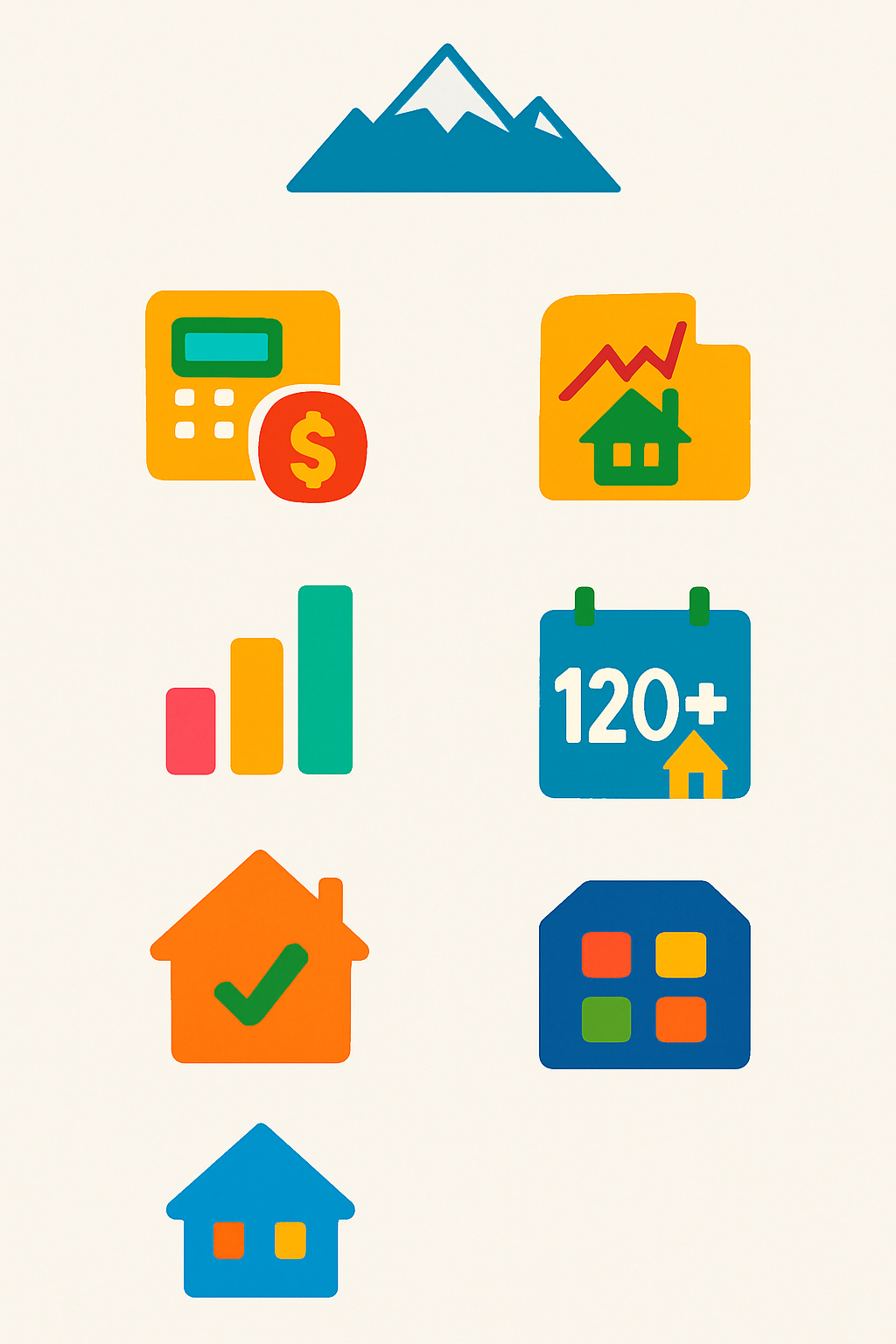
As 2025 comes to a close, we’ve been reflecting on the themes that have run through our Snow Capped blogs this year: gratitude for our homeowners and tenants, education around a shifting real estate landscape, and a steady drumbeat about flexibility—shifting from STR to winter seasonal or long-term, rent-then-sell strategies, and making data-driven decisions instead of emotional ones. Those conversations weren’t theoretical. They shaped how we served you in a year when Grand County real estate kept everyone on their toes. ________________________________________ State of Real Estate in Grand County Interest Rates & Buying Power Mortgage rates finally eased off the 7%+ highs we saw earlier in the cycle. As of late November 2025, the average 30-year fixed mortgage rate is hovering in the low-6% range—about 6.2–6.3% nationally. That’s still higher than the “good old days” of 3–4%, but lower than 2023–early-2024 peaks. Practically speaking: • Buyers are getting a bit of breathing room, especially those using government-backed loans. • Sellers are having to price more realistically and be patient; “list high and wait for the unicorn” isn’t working like it did in 2021. Days on Market & Pricing Grand County is no longer the white-hot bidding war environment of the pandemic years—but it’s far from dead. • Recent data shows median days on market around 100–110 days across Grand County, with some sub-markets (like Granby) right around that 110-day mark. • Earlier reports in 2024 also showed days to go under contract creeping up versus 2023, confirming a slower, more thoughtful market. Prices, especially in ski-adjacent areas like Winter Park, Fraser, and Granby, have come off their highs slightly rather than crashing—some regional outlooks suggest 5–10% softening in drive-to ski towns like Winter Park as the broader Denver market cooled. Translation: • Buyers: you now have more time and more leverage to negotiate. • Sellers: strategy and presentation matter more than ever—pricing, staging, rent-then-sell strategies, and timing around ski season all count. ________________________________________ Rental Market: Supply, Demand, and Shifting STR Economics All year, our blogs have highlighted a key theme: rental supply has increased faster than demand, both for properties for sale and for rent. That’s especially true now that: • More homes have come onto the market as owners test selling prices. • STR permit costs and regulations have increased in certain towns, nudging some owners to convert from nightly to seasonal or long-term. In Grand Lake, for example, the annual STR license fees jumped meaningfully in 2025 depending on occupancy tier. On the rental side: • Average long-term and seasonal rents in the Fraser/Winter Park area remain strong but not runaway. Recent data puts average rent in Fraser near $3,000/month across all property types, with 1-bedrooms in the mid-$1,600s and 3-bedrooms in the mid-to-upper $3,000s. • On the STR side, top-performing properties still do very well; strong Fraser listings can see median daily rates around $300 with the top tier commanding much higher. With more options on the market, both renters and buyers can afford to be choosier. For owners, that means: • Sharp pricing • Clean, well-maintained homes • Flexible strategies (winter seasonal, mid-term, or long-term) are what separate the properties that sit from the ones that stay occupied. ________________________________________ Looking Ahead: 2025–2026 Winter Season Early data from ski markets across the West shows occupancy pacing ahead of last year, with some reports calling out 6–13% higher bookings during key holiday periods like Christmas and New Year’s. What does that mean locally? For homeowners: • Expect solid winter demand, especially for well-located, well-priced properties near Winter Park and Granby Ranch. • Seasonal and mid-term rentals will remain attractive to families who want to “live the ski town life” for 3–6 months without committing to buying. • STR owners will continue to feel the squeeze of higher costs and regulations, making professional management and smart pricing even more important. For renters: • You’ll see more options than a few years ago, but the best-located, best-priced units still move quickly—especially 2–3 bedroom places that work well for families or roommate groups. • Budget realistically: winter in a ski town will always carry a premium, but we’re no longer in the “whatever price you ask” era. ________________________________________ Snow Capped in 2025: Growth, Vertical Integration, and Full-Cycle Service From the Snow Capped side, 2025 was a year of quiet but meaningful growth. • We’re on track to hit our goal of 120 doors under management in 2026 with our current team size. • In 2025, we successfully stepped more deeply into the transactional side of real estate, closing 7 sales this year with another 5–6 properties already lining up for Spring 2026 listings. • Thanks to the internal network between homeowners, tenants, local partners, and word-of-mouth referrals, we now truly operate as a full-cycle real estate partner: o Help you purchase o Launch and manage the rental o Maintain and improve the property o Sell and reposition when the time is right o …and then we rinse and repeat—with a constant eye on that three-way win between homeowner, tenant, and the Snow Capped team. Everything we wrote about this year—converting STRs to seasonal rentals, navigating higher STR fees, rent-then-sell strategies, and market education—was grounded in this mission: helping you make smart, sustainable decisions in a market that refuses to sit still. ________________________________________ 2026: Staying Nimble, Learning from the Past, Leaning into Opportunity If there’s one thing we know after 25 years in and around this market, it’s that the next year will surprise us. Our mindset for 2026: • Stay nimble. We’ll continue to adjust between STR, seasonal, and long-term based on what the market (and your property) is telling us. • Flow with the waves of opportunity. When demand shifts—by price point, neighborhood, or rental type—we’ll pivot with it instead of fighting the tide. • Apply the lessons of the past 25 years. We can’t eliminate every pitfall, but we can recognize patterns, avoid the obvious traps, and stay ahead of changes in regulations, fees, and demand. • Remain cautiously optimistic. 2025 gave us the chance to grow into the transactional side of real estate and build out true vertical integration. We believe 2026 will bring more chances to grow and thrive—smartly, sustainably, and together. ________________________________________ A Three-Way Win, Always As we close out 2025, our compass hasn’t changed: Create a three-way win where homeowners feel supported and profitable, renters feel respected and well-housed, and our Snow Capped team can build a healthy, enduring local business. To everyone who trusted us this year—as a homeowner, tenant, partner, or neighbor—thank you. Cheers to 2025, and here’s to whatever 2026 brings. We’ll be ready.
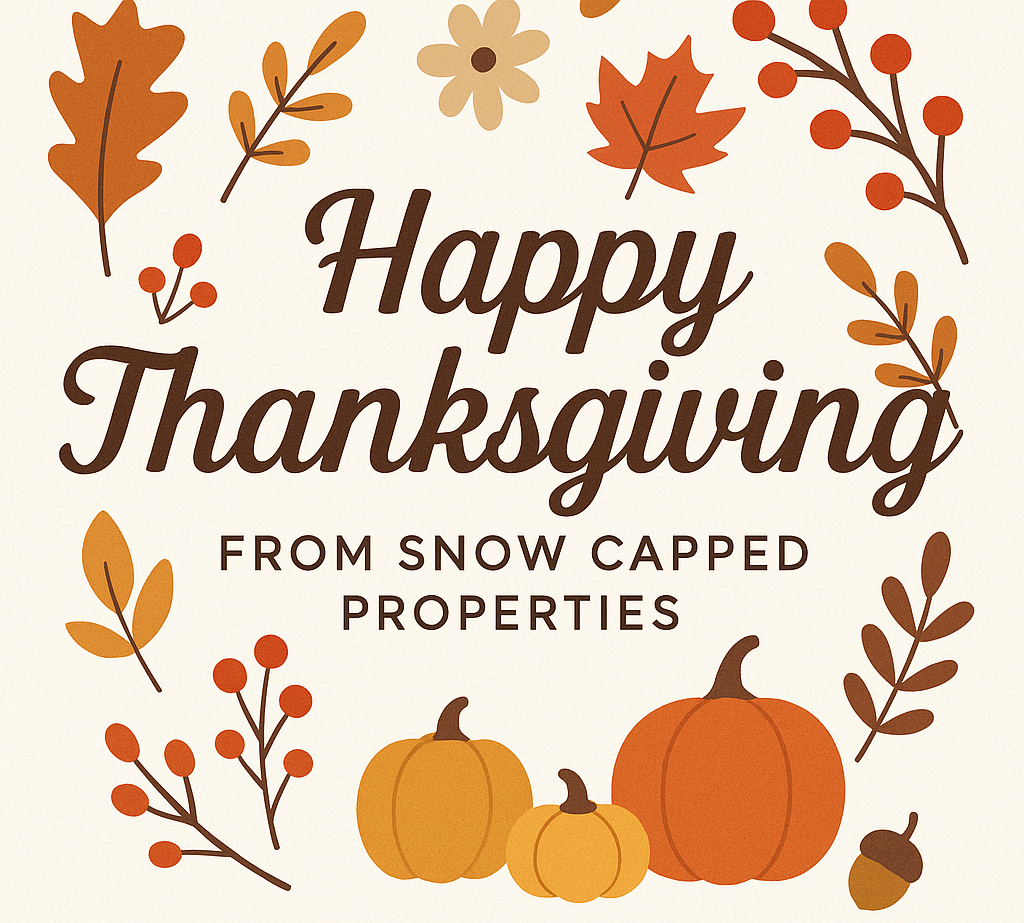
Gratitude for Our Homeowners, Tenants, Team & Community As Thanksgiving arrives, we find ourselves reflecting on just how fortunate we are to live and work in a place as special as Grand County. At Snow Capped Properties, this season is more than a holiday — it’s a moment to pause, appreciate, and acknowledge the many people who make what we do possible. Whether you’ve partnered with us for years or just recently joined our Snow Capped family, your trust, support, and shared belief in local community values are what keep us motivated and grateful every single day. 🏡 To Our Homeowners — Thank You Thank you for trusting us with your homes, your investments, and your long-term goals. Your belief in our small, locally owned management company allows us to continue doing what we love: caring for properties as if they were our own and helping you achieve peace of mind in the process. Your partnership fuels our commitment to transparency, responsiveness, and reliability — and we are truly grateful. 🏘️ To Our Tenants — We Appreciate You Thank you to the individuals and families who call our rentals “home,” whether for a season or for many years. Your respect for the properties, your communication, and your contributions to our neighborhoods make Grand County a better place to live. We hope we continue to provide a rental experience that supports your lifestyle, your comfort, and your connection to this beautiful mountain community. 👋 To Our Team — Garrison & Chloe We couldn’t do this without you. Your hard work, reliability, and genuine care for our homeowners and tenants embody what Snow Capped stands for. From late-night troubleshooting to day-to-day logistics, your dedication ensures that every property is well cared for and every resident feels supported. Thank you for showing up — not just physically, but with heart. 🔧 To Our Tradesmen & Local Partners A heartfelt thank-you to the contractors, handymen, cleaners, landscapers, snow-removal crews, inspectors, plumbers, electricians, HVAC techs, and all the behind-the-scenes experts. You are the unsung heroes of the rental experience. When something breaks, when a tenant moves out, when winter hits hard — you keep things running. Your craftsmanship, reliability, and pride in your work elevate each home we manage and ensure that owners and tenants receive the quality they deserve. 🏔️ To the Grand County Community Finally, a huge thank-you to our neighbors, friends, and local businesses who continuously support us through referrals, kind words, and community engagement. Word-of-mouth matters deeply in a small, mountain-town environment — and your support has helped Snow Capped grow year after year. We remain committed to giving back, supporting local, and contributing to the wellbeing of the county we proudly call home. ❤️ From Our Family to Yours This Thanksgiving, our hearts are full. We are grateful for the trust, relationships, and community spirit that surround Snow Capped Properties. Thank you for being part of our journey and for helping us care for the homes — and the people — that make Grand County such a special place. Wishing you and your loved ones a warm, joyful, and peaceful Thanksgiving. The Snow Capped Properties Team
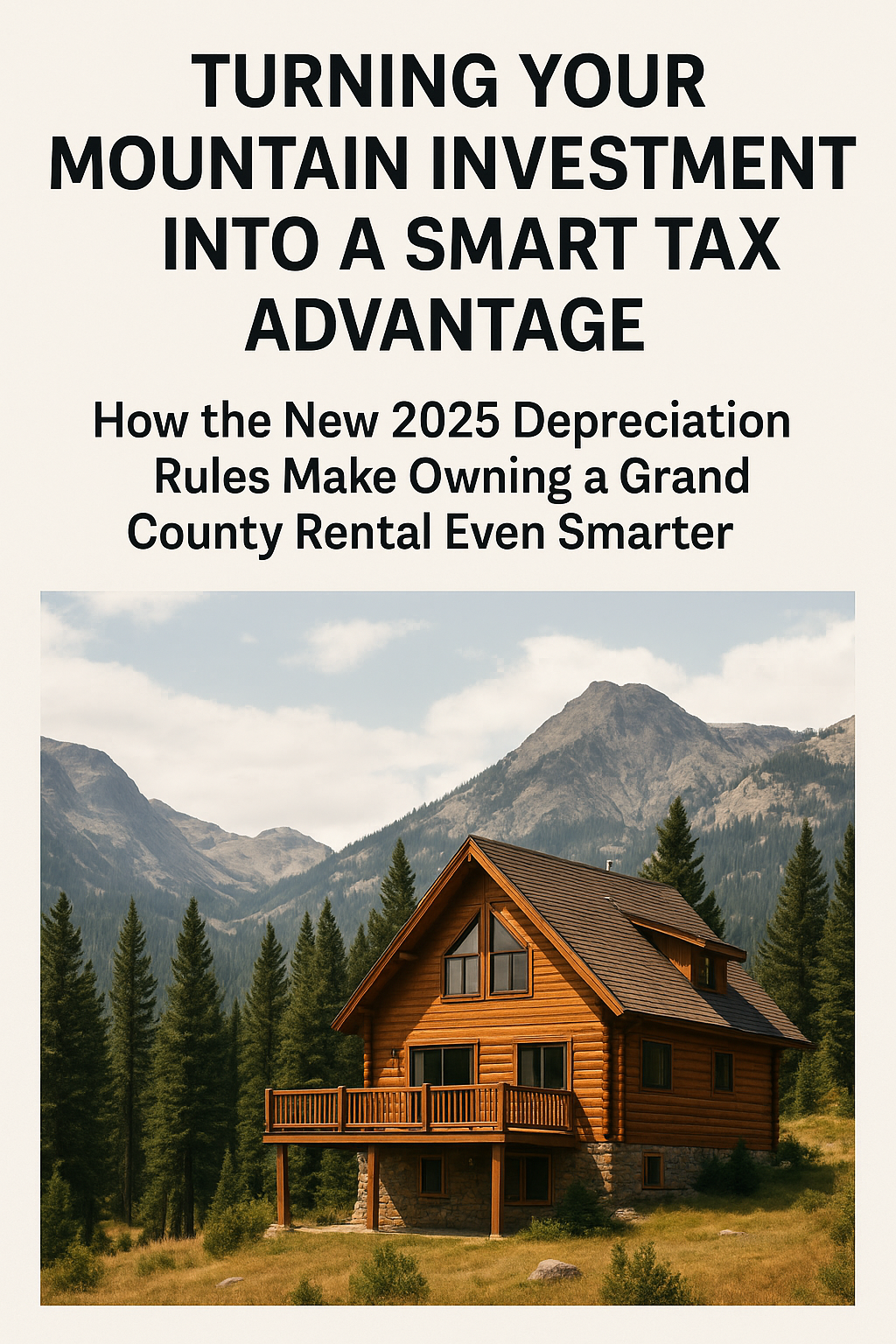
How the New 2025 Depreciation Rules Make Owning a Grand County Rental Even Smarter There’s a lot of buzz right now about the new tax law — the One Big Beautiful Bill — and for good reason. Starting in 2025, investors can take advantage of 100% bonus depreciation on certain components of new rental properties placed into service after January 19, 2025. What does that mean in plain English? If you buy an investment property and rent it out, you may be able to write off a large portion of your purchase cost up front rather than waiting 27½ years to depreciate it all. This new rule can dramatically improve your cash flow in those first few years of ownership — and that’s a game-changer for anyone buying a property in Grand County. ________________________________________ 💡 Here’s How It Works Under the new law, items with a useful life of 20 years or less — such as appliances, furnishings, flooring, fencing, landscaping, lighting, and HVAC systems — may qualify for immediate deduction through bonus depreciation. That means if you purchase a property and place it in service as a rental in late 2025, you could deduct the full value of many of those assets in your first year. The building itself will still depreciate over 27.5 years, but this accelerated benefit allows you to offset a significant portion of your rental income early on. For example, a $600,000 duplex purchased this fall could potentially unlock $80,000–$100,000 in accelerated deductions — depending on the breakdown of personal property and improvements. That’s money back in your pocket sooner, and for many, it’s the difference between a property that just covers costs and one that generates real return. ________________________________________ 🏠 Why Snow Capped Is Your Advantage Here’s where Snow Capped Properties stands apart. We’re not just a property manager — we’re your full-service investment partner. Whether you’re a first-time investor or looking to expand your portfolio, we can: • Help you identify and purchase the right property — from Fraser and Winter Park to Granby and Grand Lake. • Run the numbers — including estimated rents, operating costs, and even potential tax benefits under the new depreciation rules. • Handle the setup and management once you close — from tenant placement and maintenance to compliance and financial reporting. No other operator in Grand County provides this level of end-to-end service — buy, rent, and manage — all under one roof, backed by 25 years of local experience and a data-driven approach to performance. ________________________________________ 📊 What This Means for You If you’ve been waiting for the right time to buy a mountain property, this may be it. With: ✅ Strong long-term rental demand year-round ✅ Expanded tax incentives through bonus depreciation ✅ Local management that protects your investment and maximizes income — there’s never been a better opportunity to turn your Grand County dream home into a performing asset. ________________________________________ 🤝 Let’s Get Started Whether you’re curious about what qualifies under the new depreciation rules, want to run numbers on a specific property, or are ready to start shopping, our team can walk you through every step. At Snow Capped Properties, we help you buy it, rent it, and manage it — all in one place. 📞 Contact us today to learn how to make your next investment work harder for you in 2025 and beyond.

🏠 Homeowner Alert: Scams Are on the Rise — Here’s What to Watch For At Snow Capped Properties, we pride ourselves on protecting our homeowners and their investments. Unfortunately, scams targeting property owners are becoming more sophisticated and frequent — especially in smaller communities where trust and familiarity are the norm. Just this month, we encountered a new type of scam attempt that could have easily fooled even the most careful homeowner. 🚨 Real Example: The “Utility Shut-Off” Scam A neighbor recently received what looked like a gas shut-off notice — complete with official logos and dates — and passed it along to the actual homeowner. Because it came from a trusted neighbor, the message felt legitimate. The homeowner, naturally wanting to resolve the issue quickly, was ready to initiate payment through the link provided. Fortunately, our team was looped in just in time and spotted multiple red flags: - The sender’s email domain didn’t match the actual utility company. - The link redirected to an unofficial payment portal. - The notice referenced an incorrect account number. Thanks to quick communication, no money was lost — but it was a close call. 🧠 Common Homeowner Scam Examples - Fake Utility or Service Notices Scammers impersonate power, water, gas, or internet providers, claiming service will be disconnected unless immediate payment is made. - Property Tax or HOA Impersonation Fraudsters pose as county tax offices or HOA management, demanding “urgent” back payments or fees — often with convincing logos and letterheads. - Rental Listing Scams Scammers copy photos and details from legitimate listings (sometimes your own property) and repost them online with fake contact info, asking for deposits from unsuspecting renters. - Home Repair or Maintenance Cons Someone shows up offering immediate repair or maintenance services, often asking for large upfront payments or access to the property without verification. - Wire Transfer or Payment Diversion Schemes Common in real estate transactions — criminals intercept email threads between agents, property managers, or homeowners, and send “updated” wiring instructions. 🧩 How to Protect Yourself - Pause before paying: Always verify any payment request directly through a verified number or website. - Confirm sources: If a message comes through a neighbor, friend, or even Snow Capped, confirm it through official channels before acting. - Watch for urgency: Scammers often use high-pressure language (“immediate disconnection,” “final notice,” “act now”) to trigger quick responses. - Check the details: Look for misspellings, wrong addresses, and fake domains. Loop in your property manager: If something feels off, contact Snow Capped Properties first. We’re here to help verify any notices or requests related to your property. 🏔️ Our Commitment At Snow Capped Properties, we take scam prevention seriously. Our local presence means we’re often the first line of defense in catching these red flags before they cost our homeowners time or money. If you ever receive a suspicious notice, email, or call related to your property, please contact us directly before taking any action. 📞 Stay Safe, Stay Local

At the University of Colorado Boulder, mentorship has always been a cornerstone of growth — for students and alumni alike. For me, that journey began over two decades ago. I graduated from CU Boulder’s Leeds School of Business in 2002, majoring in Management Information Systems (MIS). While still in school, I purchased my first rental property as a junior and my second as a senior — experiences that shaped my lifelong passion for real estate and entrepreneurship. In 2012, I returned to campus in a new role — as a mentor in the Professional Mentorship Program (PMP). Since then, I’ve had the privilege of mentoring many talented students who’ve gone on to do amazing things in their careers. One of those students was Garrison Gates, whom I was paired with in 2021, during his junior year. What began as a mentor-mentee connection soon evolved into something even more meaningful. After Garrison’s graduation in 2023, Snow Capped Properties — the company my wife and I own and operate in Grand County — was at a pivotal point. We were deciding whether to keep things small at around 35 managed properties (“doors”) or take the leap and grow. With Garrison’s passion, work ethic, and curiosity for real estate, we saw an incredible opportunity to expand together. He officially joined Snow Capped Properties, and with his help and our team’s dedication (couldn't have done all this without Chloe's help, too!), we’ve grown to manage over 100+ properties today — a milestone we’re proud of, and one that reflects both teamwork and mentorship in action. Thirteen years after joining the PMP program, I still mentor through CU. Most recently, I’ve been working with Andrew De Lisa (on the far left in our photo), who will graduate in May 2026. In a full-circle moment, Garrison now mentors his own mentee, Beshal Malla, both of whom share a deep interest in real estate and entrepreneurship. We’ve always appreciated the mentors, professors, and peers who offered us guidance when we were young and still finding our way. Now, standing on the other side, it feels truly rewarding to give back — helping shape the next generation of leaders, thinkers, and builders. The CU Boulder PMP program has been an incredible bridge between business education and real-world opportunity. It’s proof that mentorship doesn’t just build careers — it builds relationships, communities, and in our case, even businesses. 🔗 Learn more about CU’s Professional Mentorship Program here: CU Boulder PMP Program


